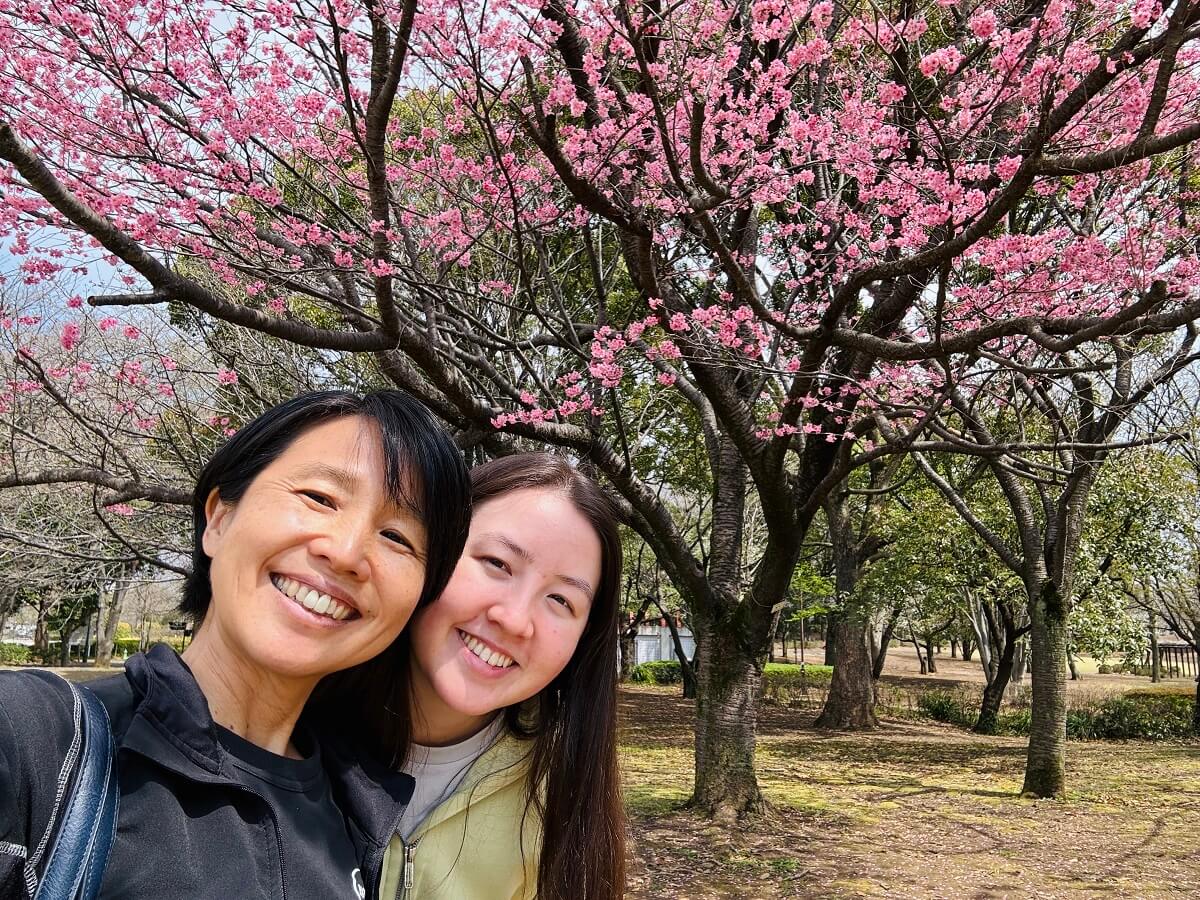Embracing Wabi-Sabi Leadership: Nurturing a Culture of Good and Sustainability
In March this year, I had the opportunity to go back to my native country, Japan, working remotely and spending time with my family.
We timed this visit to coincide with the anticipated cherry blossom season. However, due to a sudden change of weather, the cherry blossoms, which symbolize the fleeting beauty of life, delayed their bloom.
We thought we'd miss it entirely.

But as luck would have it, the blossoms opened in their full glory just before we were set to leave, making our farewell to Japan exceptionally memorable.
On reflection, this moment of unexpected encounter with the extraordinary beauty of passing seasons symbolized the essence of the Japanese ancient philosophy of Wabi-Sabi.
I wrote about this reflection on my LinkedIn post and was pleasantly surprised how the Wabi-Sabi concept resonated with leaders.
So, what’s Wabi-Sabi?
Wabi-Sabi is the art of finding beauty in imperfection, appreciating simplicity, and acknowledging the transient nature of all things.
The falling petals of cherry blossoms as we welcome the new season signify the fact that nothing lasts forever — both in life and in business. And in turn that means that our wins (and even our failures) are to be treasured. They are all part of the magnificent journey we are on.
This truly treasured idea is widely incorporated into poetry and traditional leadership ideology in Japan, which is to find the value in the experience, connection and learning in each moment and situation. Adding this perspective to the vision and outcome-driven approach leaders are expected to have today helps those leaders broaden the definition of the success they can experience.
In a world where the pursuit of perfection often overshadows the beauty of imperfection, leadership takes on a profound role in shaping not just organizational success but also the very essence of human connection and social responsibility.
Being a leader is challenging. Not everything in business is beautiful and ideal. Often, things go wrong. People behave differently from our expectations. Disasters may occur at any moment…
So, how can we navigate in this challenging time while bringing the best of our leadership quality to all these moments?
The Essence of Leadership

Leadership, at its core, embodies the art of guiding individuals and organizations toward a shared vision, fostering growth, and inspiring positive change.
But what truly defines leadership goes beyond mere direction; it encapsulates the essence of purpose, connection, and responsibility.
Just as Wabi-Sabi celebrates imperfection and transience, effective leadership embraces authenticity, empathy, and the recognition of the inherent value in every moment.
The ability to let go when needed or the ability to appreciate the times of challenges is hard to come by. Equally, the ability to see the long-term benefits for the collective good is another quality that is often missing in corporate leadership in recent years, creating sustainability issues and even existential threats to humanity.
The Intersection of Leadership, Social Responsibility and a Sustainable World

At the heart of leadership lies a profound commitment to the common good – a commitment to not only drive organizational success but also to uplift communities and contribute to the greater good.
Responsible leaders don’t just see social responsibility as their responsibility. It comes naturally to them as they see their peers and communities as part of their own success — much like treating everyone as a part of their extended family.
The decisions purpose-driven leaders make transcend mere profit margins and short-term gains. The choices they make create lasting impact and success of the collective, both within and beyond the confines of the workplace.
It’s those leaders who support our work at B1G1 as well. When we set out on our journey 17 years ago, there was no real awareness or trend for CSR and ESG like today. But the idea of shared global stewardship resonated with many leaders. Today, those businesses have created nearly 350 million impacts in the world, creating millions of smiles and moments of empowerment of lives around the world.
And fortunately, doing good is, indeed, great for business today as well.
For example, according to a study by Cone Communications, 64% of millennials consider a company's social and environmental commitments when deciding where to work. This highlights the importance of fostering a culture of social responsibility in attracting and retaining top talent.
Research from Gallup shows that organizations with highly engaged employees experience 21% greater profitability. Effective leadership plays a crucial role in fostering employee engagement by inspiring purpose, promoting transparency, and nurturing a culture of trust and collaboration.
According to a report by McKinsey, companies with strong sustainability practices outperform their peers financially, with a 55% higher return on equity and a 20% higher market valuation. This highlights the business case for integrating sustainable practices into organizational strategy and decision-making.
Some of our Members also tell us how their businesses have grown or transformed as a result of them integrating acts of kindness with a genuine intention to do good. So, being able to do good while experiencing great outcomes together with stakeholders who are inspired and engaged becomes a real win-win-win.
A socially responsible leader begins by setting a vision and mission that are deeply rooted in values of sustainability, equity, and compassion. And they strategically integrate a success formula into the organization culture and behaviors for lasting success.
Here is a powerful message from one of my mentors and an extraordinary leader, Paul Polman.
Just as the concept of Wabi-Sabi emphasizes the beauty of simplicity, effective leadership entails aligning organizational goals with broader societal needs, embracing a triple-bottom-line approach that values people, planet, and profit in equal measure.
And to create strong triple bottom lines, we also need to set strong triple top lines - measures of our leadership performance.
Leading by Example: Actions Speak Louder than Words
Although it’s a good first step to clearly say what you are here to achieve, what we actually do speaks volumes in the realm of leadership.
Leading by example means embodying the values and principles one espouses, fostering a culture of integrity, accountability, and ethical conduct.
Leadership integrity shines brightest in moments of challenge and adversity, inspiring trust and confidence among team members and stakeholders alike.
Empowering Teams to Engage in Socially Responsible Practices with Empathy
True leadership empowers individuals to become agents of positive change.
By fostering a culture of inclusivity, innovation, and empowerment, socially responsible leaders cultivate an environment where every voice is heard, every idea is valued, and every action contributes to the collective pursuit of purpose and impact.
It’s now very clear that supporting your team to engage more in the creation of positive impact is a great investment. And doing that with genuine intent to make a difference harnesses the power of empathy in your organizational culture, leading to increased value of your business.
Holding Themselves and Stakeholders Accountable for Learning
Accountability lies at the core of effective leadership. Responsible leaders hold themselves and their stakeholders accountable for the impact of their actions, ensuring transparency, fairness, and ethical conduct at every level of operation.
But no matter how much we try, things can go wrong in our day to day. People make mistakes. Unexpected ‘disasters’ can occur. By embracing the principles of Wabi-Sabi, leaders acknowledge the imperfections inherent in every endeavor and strive to learn, adapt, and grow from each experience.
Transparency, integrity, empathy, and commitment to sustainable practices are among the defining characteristics of extraordinary leaders. Just as Wabi-Sabi celebrates the beauty of imperfection, effective leadership embraces authenticity, vulnerability, and the willingness to embrace change and uncertainty, leading their teams to demonstrate strength, belief and courage.
Final Thoughts: Embracing the Imperfect Journey
As we navigate the complexities of leadership in an ever-changing world, let us embrace the principles of Wabi-Sabi – finding beauty in imperfection, appreciating the transient nature of all things, and nurturing a culture of purpose, connection, and compassion.
Together, we can strive to lead with authenticity, integrity and a commitment to the common good, knowing that in the pursuit of a greater good, every moment, every effort, and every imperfection is a testament to the beauty of our collective journey.
Reflecting on the Wabi-Sabi philosophy, we ask "What if we can bring this awareness into our daily lives and work, finding joy and purpose in the journey, not just the destination?"
Just like the falling petals of those beautiful cherry blossoms, our journey will mature and end one day. On completion of each chapter, whether we feel rewarded and satisfied or regretful and dissatisfied is up to how we show up everyday.
Reflecting on the journey of our social impact efforts over the years, I'm grateful for these moments of reflection and the people who allow me to be here today.
